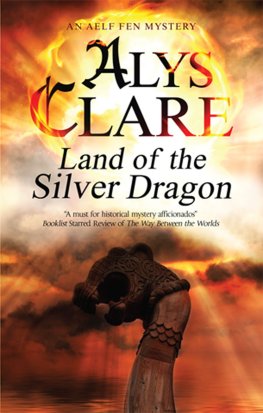Alys Clare - Mist Over the Water
Here you can read online Alys Clare - Mist Over the Water full text of the book (entire story) in english for free. Download pdf and epub, get meaning, cover and reviews about this ebook. year: 2011, publisher: Ingram Distribution, genre: Detective and thriller. Description of the work, (preface) as well as reviews are available. Best literature library LitArk.com created for fans of good reading and offers a wide selection of genres:
Romance novel
Science fiction
Adventure
Detective
Science
History
Home and family
Prose
Art
Politics
Computer
Non-fiction
Religion
Business
Children
Humor
Choose a favorite category and find really read worthwhile books. Enjoy immersion in the world of imagination, feel the emotions of the characters or learn something new for yourself, make an fascinating discovery.
- Book:Mist Over the Water
- Author:
- Publisher:Ingram Distribution
- Genre:
- Year:2011
- Rating:3 / 5
- Favourites:Add to favourites
- Your mark:
- 60
- 1
- 2
- 3
- 4
- 5
Mist Over the Water: summary, description and annotation
We offer to read an annotation, description, summary or preface (depends on what the author of the book "Mist Over the Water" wrote himself). If you haven't found the necessary information about the book — write in the comments, we will try to find it.
Mist Over the Water — read online for free the complete book (whole text) full work
Below is the text of the book, divided by pages. System saving the place of the last page read, allows you to conveniently read the book "Mist Over the Water" online for free, without having to search again every time where you left off. Put a bookmark, and you can go to the page where you finished reading at any time.
Font size:
Interval:
Bookmark:
Alys Clare
Mist Over the Water
ONE
It was raining. It had been raining all day and most of the day before. Now the temperature was dropping as light faded on the short, late October day and the incessant raindrops were turning into hard, spiteful little pellets of ice.
The man stared wistfully up the muddy, puddly track along which the last of his companions had lately disappeared. He wished more than anything that he could down tools and follow. The lodgings might be bare, basic, chilly and mean, but anything was better than standing hopelessly out in the cold rain. He sighed and once again hefted the long pole, noticing how the light of a flare up on the abbey wall caught the vicious, hooked barbs of the trident on its end. Then, for what felt like the thousandth time that day, he stood right on the edge of the steep bank above the stream and, focusing his mind, tried to seek out the dark, secret place where the eels lay burrowed deep in the black mud.
He waited. He lunged, thrusting the gleeve the locals had taught him the new word down into the slow-moving water. He felt the cruel points go down, down into the sludge of the stream bed. He muttered a swift prayer.
He drew the gleeve out of the water. The three points dripped diamond-bright droplets back into the stream. They were empty; for the thousandth time he had failed.
He knew he was asking too much of himself, for this was a new skill and even the experienced eel men had remarked that conditions were tough today, as the drop in temperature had sent the eels deep down into the mud where they were undoubtedly going to remain. Nevertheless, all the other men had caught something; only he would return empty handed. It was a depressing thought.
His name was Morcar, he was about twenty-five or twenty-six he was not sure and he was a flint knapper. He lived in the Breckland with his widowed mother, Alvela, and such was his skill at his work that normally the two of them wanted for little. He could strike the flint by instinct and from his quick hands the flat-faced, glittering black stones fell in neat, regular shapes, all ready for building or facing walls. He was reliable and he was honest. By the standards of their particular stratum of society, he and his mother were considered quite comfortably off. But times were hard and everybody from lord to serf had to make economies. Nobody was building anything new; few men sought out the services of a flint knapper even a very good one when they were struggling to put bread on the table.
In this the third year of his reign, King William was proving to be an exacting monarch. He had held England safe from the attempt made two years ago by his brother, Duke Robert of Normandy, to seize it from him, which his dubious people were informed was something to be celebrated. However, Duke Roberts aim had been to unite England and Normandy under one ruler, as had been the case in the time of the brothers great father, William the Conqueror an aim both brothers shared. Duke Robert had failed to win England. Now it was King Williams turn to make his attempt on Normandy.
The campaign had got off to a good start and Robert, alarmed at the speed with which his dukedom seemed to be slipping away from him, had desperately appealed to his overlord, King Philip of France, for help, who obliged with an ostentatious show of force. The wily William, however, had swiftly sent his French counterpart a huge bribe, which had sent Philips army scuttling back to his own realm.
The bribe had to be paid for, just as did every single man, horse, weapon, wagon and its contents in King Williams army, and the payment came from the taxes extracted from the people of England. It would have been hard enough in times of plenty, but the last two years had seen an unprecedented succession of natural disasters. It had rained in spring, summer, autumn and winter. In late summer a year ago, there had been a terrifying earthquake that had had the priests moaning and tearing their hair, crying out that God was furious with his sinful people and the only way to appease his wrath was for every man to give as much as he could and more to the church. The earthquake had seemed to be the natural expression of a climate gone mad; it had been so cold that the crops hadnt ripened until well into the autumn, and the meagre harvest had continued into November.
And all the time there was the constant, ongoing worry of taxation. The king is waging this campaign against his brother on the peoples behalf, the men of power said. Pay up, itll be worth it in the end!
As if there were any choice.
People paid up. Then they scrimped and saved and tried to replace what theyd just had to stump up, only to have a further demand.
It was no wonder nobody had much use for a flint knapper.
Morcar had heard of the wonderful new cathedral that the Normans had commanded to be built on the Island of the Eels. The new rulers of England were building, even if nobody else was; they were busy stamping the land with their big, brash constructions that shouted out for all to hear that the old ways were gone for ever and a harsher order now held sway.
There had been a monastery on the Isle of Ely for more than 400 years, since the time of the beloved St Etheldreda who, despite being twice married, had maintained her maiden state and had finally been allowed to flee to the island, the gift of her second husband. There she had founded a double community for monks and nuns, becoming its first abbess. She died of a tumour on the throat and her grieving community had buried her in the monastery grounds, later moving her body into the little monastery church. The removal revealed a miracle: despite having been under the earth for sixteen years, St Etheldredas body was sweetly fragrant and perfectly preserved, the tumour magically healed.
For 200 years, Etheldredas community flourished around the sacred burial place of its beloved founder. Then the Vikings came. In the wake of destruction came resurrection; a Benedictine community settled on the island and the focus of their love and devotion was St Etheldredas shrine.
It seemed to those who cherished and honoured the old ways that the Norman newcomers must be blind and deaf, totally insensitive to the precious, fragile atmosphere of Etheldredas little church, where not only her bones but those of other worthy figures were safely interred. Showing scant respect, the Normans were knocking it down, and now a new, grand, showy cathedral was slowly rising up where once it had stood.
Cathedrals were built from flint, Morcar had thought when first he had learned about what was going on at Ely; from flint and stone. There was no work at all back at home so he had carefully wrapped his tools, shouldered his pack, kissed his mother goodbye and headed off, out across the heathland and then down into the Fens and over the water to the island. There, however, he had met with stunning, bitter disappointment; the new cathedral was being built not of flint but solely of stone, purchased from Peterborough Abbey and ferried from the quarry to Ely on barges that wound their way through the inland waterways.
The masons, hard at work on the magnificent new building, had no use at all for a flint knapper. However, there was work to be had on the island for any man willing to do it, for the monks of Ely were paying their brethren at Peterborough for the stone in eels. Thousands of eels: some said more than 8,000 per year. The rich waters around the island offered a constant, generous supply of eels, and it was the obvious thing to do. Morcar had heard tell that in one year, an incredible 52,000 eels had been caught, but this fact had been related to him by a loose-mouthed drunkard, and he was quite sure it was an exaggeration.
Morcar had to earn money, for his own well-being and that of his mother depended on it. The poor and the hungry could not afford to be proud, so he bowed his head, stowed the tools of his trade safely away in his lodgings and offered himself as an eel catcher. It looked easy and as he watched and listened to the other men, his confidence rose. The eel were caught in a variety of ways, they told him, depending on the season. When the water was warm in spring and summer traps were set, but in autumn and winter the eels retreated down into the deep mud of the stream bed, where they could only be caught with the long eel gleeves. Them eels are made out of that mud, see, an older man had informed Morcar. They disappear deep down there as the year fails, then in springtime out pop a whole lot more of them, fresh-made out of the guts of the very earth.
Font size:
Interval:
Bookmark:
Similar books «Mist Over the Water»
Look at similar books to Mist Over the Water. We have selected literature similar in name and meaning in the hope of providing readers with more options to find new, interesting, not yet read works.
Discussion, reviews of the book Mist Over the Water and just readers' own opinions. Leave your comments, write what you think about the work, its meaning or the main characters. Specify what exactly you liked and what you didn't like, and why you think so.













